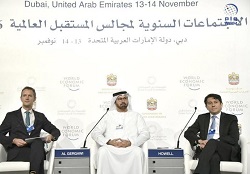Media Center
UAE launches unprecedented six-pillar plan to prepare for Fourth-Industrial-Revolution
The UAE is leading the world when it comes to adopting Fourth-Industrial-Revolution technologies, said Mohammed Abdullah Al Gergawi, Minister of Cabinet Affairs and the Future, Co-Chair of the Annual Meeting of the Global Future Councils, revealing a six-pillar plan launched by the UAE Government to achieve that objective.
Al Gergawi held a press conference during the Annual Meeting of the Global Future Councils - taking place at Dubai’s Madinat Jumeirah on November 13-14, 2016 - where he announced the plan, which was set in collaboration with the World Economic Forum (WEF) and seeks to transform the Fourth Industrial Revolution into a global movement spearheaded by the UAE.
First Pillar: The UAE Government will establish the Fourth Industrial Revolution Council, the first of its kind in the world. The Council will report directly to the Cabinet and will be supervised by the Ministry of Cabinet Affairs and the Future. Council members will include representatives from government, private-sector, and academic organisations.
Second Pillar: Working closely with the World Economic Forum (WEF) and through the Global Future Councils to formulate a global governance framework that regulates legislative and executive efforts to implement Fourth-Industrial-Revolution technologies, and to create global markets for them in collaboration with governments and relevant private-sector organisations.
Third Pillar: In collaboration with the World Economic Forum, the UAE Government will work to establish Fourth Industrial Revolution Councils, which aim to provide advisory support to decision makers around the world.
These councils will be tasked with studying the effects of Fourth-Industrial-Revolution technologies on economic and social systems, determining economic and investment opportunities within key sectors where these technologies can be implemented, and providing advisory support for governments looking to set legislative and executive frameworks – along the lines of the governance framework formulated through the plan’s second pillar – in order to implement these technologies.
Fourth Pillar: Launching a programme that seeks to include governments from around the region in the network of experts that take part in the Global Future Councils and, consequently, enhancing the event’s role in supporting economic development in those economies.
The network includes more than 5,000 members and experts from governments, international organisations, private companies, and academic research institutions. The programme will come out with several plans, events, and initiatives that will be announced at a later date.
Fifth Pillar: The UAE will be the first country in the world to experiment with and implement the technologies of the Fourth Industrial Revolution, creating new markets for them. This builds on the steps the government has already implemented through initiatives and strategies promoting technologies such as blockchain, smart transportation, 3D printing, and artificial intelligence.
Sixth Pillar: The UAE Government will be the first in the world to design and build a framework within its national agenda that aims to prepare governments for the future, in collaboration with the World Economic Forum. The framework focuses on measuring the readiness of governments in the next ten years against six main criteria: technology and innovation, economy, society, natural resources and the environment, security, and governance.
Al Gergawi noted that the Annual Meeting of the Global Future Councils saw top-tier future experts from around the world converge in the UAE – in 35 different councils – to set the foundations for a better future for generations to come.
The Annual Meeting of the Global Future Councils is much more than a conference. It is a platform for finding pragmatic and applicable solutions and initiatives, Al Gergawi said.
"The UAE Government realises the importance of planning for the future," he explained. "With that in mind, it set off to proactively turn the technologies of the Fourth Industrial Revolution into reality. The Councils saw 50 Emirati experts take part, underlining the government’s seriousness in its efforts to build the future today."
More than 700 future experts from around the world took part in the Annual Meeting of the Global Future Councils, where they worked to formulate visions and initiatives that bring together government and private-sector institutions to find solutions for future challenges, turning them into opportunities that improve people’s lives and make for a successful future.


